The Best Probiotics for Gut Health I’ve Ever Used: Improve Digestion, Eliminate Bloating, and Balance Your Gut
Probiotics are a staple component of most healing protocols, as they provide a vast array of health benefits.
a staple component of most healing protocols, as they provide a vast array of health benefits.
Here we will explore what probiotics are, the huge importance of gut health for our overall health, and by far the best probiotics for gut health that I’ve ever used.
Some of the links in this article are affiliate links. This means that if you click the link and subsequently make a purchase on the merchant’s website, we may earn a small commission at absolutely no additional cost to you. All opinions are entirely my own. I have used all products mentioned personally for years.
What Are Probiotics?
Probiotics are the live “good” bacteria and yeasts that are present throughout the body such as in the gastrointestinal tract, mouth, and female reproductive organs.
There are trillions of bacteria that are found in and on your body, and a large portion of these are probiotic bacteria.
Bacteria can be either “good”/health promoting or “bad”/pathogenic, meaning they can contribute to illness. Both forms are normally found in the body.
As long as one’s good probiotic bacteria populations are kept intact and in sufficient quantity, bad bacteria and other pathogens can be kept at bay, having no adverse impact on our health.
These organisms are referred to as microbiota or gut flora (if found in the gastrointestinal tract) and this collective environment is referred to as the microbiome.
A great deal of our microbiome is formulated at birth, from the birth canal, our mother’s skin, and breast milk. We then continue to acquire bacteria from our environment, and around the age of 2 or 3, our microbiome is well established.
There are more than 500 species of probiotic bacteria.
Furthermore, there are 7 “core genera” or groups of probiotic species. These include lactobacillus, bifidobacterium, bacillus, saccharomyces, streptococcus, enterococcus, and escherichia.
There are then many different types of strains within these groups/species, which make up a diverse range of bacteria within the microbiome.
Encouraging and maintaining microbiome diversity is a key part of optimizing gut health and a health promoting gut environment.
Probiotic bacteria have many important functions including helping to digest food, maintain gut motility, keeping pathogens at bay, strengthening the lining of the intestines/gut barrier, and producing vitamins and nutrients such as short chain fatty acids.
Probiotics also produce lactic acid, which is an organic acid that helps with nutrient absorption and has antioxidant effects in the body.
These bacteria make up a big part of why “gut health” is so important, which is discussed further below. 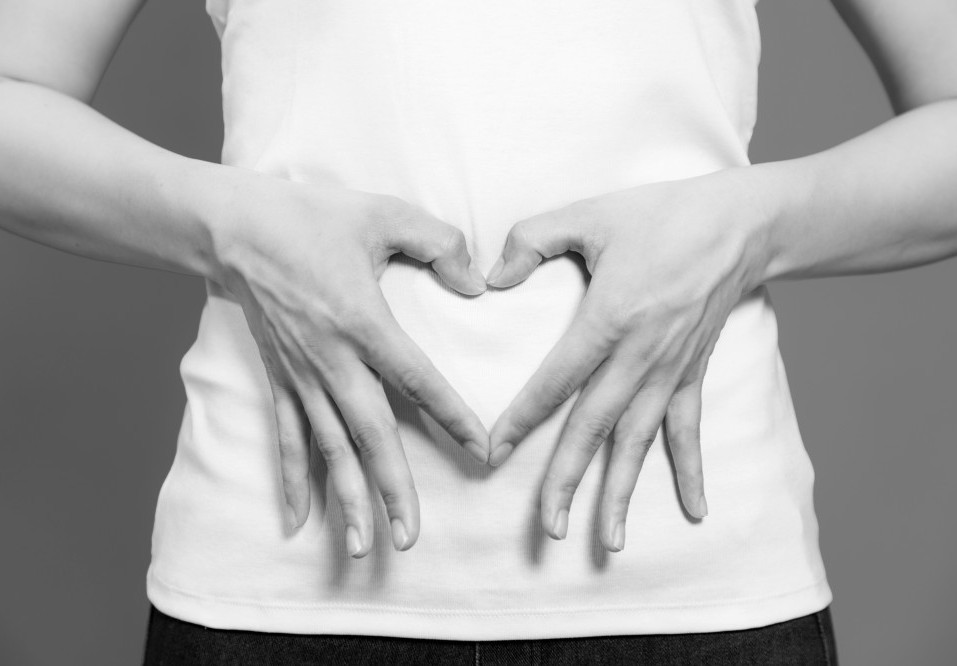
Probiotic bacteria can be acquired from soil, food, and/or supplements.
Foods that contain probiotics include yogurt, kefir, fermented vegetables such as sauerkraut and kimchi, and fermented drinks such as kombucha.
Probiotic supplements come in a wide variety of forms. These products use “Colony Forming Units” to measure the amount of bacteria present in that given product.
Probiotic products also typically contain both “colonizing” and “transient” strains of bacteria. Colonizing strains will become established and proliferate in the gut to fulfill their roles. Transient strains will fulfill their roles such as helping to eradicate pathogens, and then they will exit the body in a relatively short period of time.
While it is excellent to include probiotic rich foods as part of one’s whole food eating plan, probiotic supplements are often used as a way of acquiring a higher potency of bacteria and for targeted therapeutic purposes.
Furthermore, while very nutritious, probiotic foods tend to be very high in histamine. Histamine is a chemical that is a helpful part of immune function, however, when various imbalances and illnesses are present, we can be hypersensitive to histamine – both the histamine that is made in our body, and ingested histamine found in various foods.
This is another reason probiotic supplements may be a preferred method to acquire the health benefits of these bacteria.
Much more on gut health and a gut healing eating plan can be found here.
The Huge Importance of Gut Health for Overall Health
The gut is one of the most important areas to focus on when healing from illness, especially chronic illness.
This is because a balanced and healthy gut is responsible for maintaining so many key areas of our physiological function and overall wellness.
Maintaining a strong presence of probiotic bacteria is an essential factor in ensuring optimal gut health and henceforth enabling all of the important physiological roles that the gut is responsible for.
Some of the main roles that the gut plays in maintaining our health are:
- Immune function
The majority of our immune function resides in the gut.
Cells in the gut lining produce antibodies that help to identify and eliminate various forms of pathogens, or illness causing organisms.
Furthermore, probiotic bacteria themselves help to fend off pathogens and weaken their effect on the body.
Hydrochloric acid, which is acid produced in the stomach when food is eaten, is also used to neutralize ingested pathogens.
- Maintaining mental & emotional health
An entire nervous system in our body resides along the entirety of the gastrointestinal tract. This is the enteric nervous system.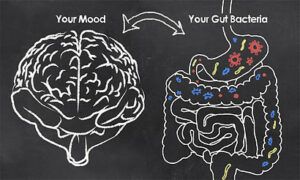
This is why the gut is often referred to as the “second brain.”
Furthermore, the majority of the neurotransmitter serotonin that is made in the body is made in the gut, not the brain!
Serotonin has many functions including stabilizing mood, regulating sleep, appetite, promoting a sense of well-being, and more.
The enteric nervous system comprises hundreds of millions of neurons and is also interconnected with the other nervous systems of the body such as the parasympathetic nervous system.
It is connected to the brain via the vagus nerve and what is referred to as the Gut Brain Axis.
Due to this, our mental & emotional health is closely linked to the state of our gut.
- Ensuring optimal digestion and assimilation of key vitamins, minerals, amino acids, and nutrients
The gastrointestinal tract is responsible for breaking down the food that you eat so that the nutrients can be absorbed into the bloodstream and delivered throughout the body to serve their various purposes.
Probiotic bacteria help with the digestive process and aid in the process of extracting nutrients from food so that they may be used by the body.
Optimal digestion is key so that vitamins, minerals, amino acids, and nutrients can be absorbed and assimilated properly and henceforth be effectively utilized by the many organs and systems that depend on them to function well.
- Ensuring sufficient detoxification ability and hormone balance
A great deal of toxins (such as heavy metals, environmental toxins, biotoxins, synthetic chemicals, etc) and excess hormones such as estrogen are eliminated from the body via the liver and then the through the intestines and out via stool.
If the gut is imbalanced, this exit pathway can be compromised, leading to a reabsorption and recirculation of these toxins and excess hormones.
What Causes Our Gut to Become Imbalanced?
There are many common factors that can contribute to gut imbalance and the reduction of probiotic populations in our gastrointestinal tract.
These can include:
- Antibiotics
Antibiotics, while necessary sometimes in select cases, indiscriminately kill off all of the bacteria in the gastrointestinal tract, including the good bacteria/probiotics.
It is very important if you have to take antibiotics to focus on gut healing and repopulation of probiotics following the course of antibiotics.
It is also important to know that there are a plethora of powerfully effective natural antibiotic options as well, which do not have such a detrimental impact on one’s intestinal bacterial environment.
As a child, I had chronic ear infections and was on antibiotics for long periods of time. This certainly contributed to my development of gut imbalance at a young age.
- Gut Infections

Gut infections such as Small Intestinal Bacterial Overgrowth (SIBO), candida/fungal overgrowth, and parasitic infection can all contribute to a reduction of probiotic colonies in the gut.
This is because the pathogens that are involved with each of these types of infections can kill important strains of good bacteria in your gut such as bifidobacterium and lactobacillus.
If such gut infections go untreated for considerable periods of time, probiotic presence in the gut continues to become compromised.
- Processed Foods/Poor Diet
Processed foods that contain synthetic preservatives, additives, and other such ingredients have an adverse impact on gut health in a variety of ways.
These ingredients can contribute to the reduction of probiotic populations in the gastrointestinal tract, while encouraging the proliferation of pathogenic bacteria.
Furthermore, diets that are high in sugar can contribute to gut imbalance by feeding gut pathogens, which will further reduce probiotic presence, as explained above.
Making sure to include a variety of fresh, whole foods and good quality proteins in your diet is key to ensure optimal and balanced gut health.
The 3 Best Probiotic Supplements for Gut Health
Having tried around 30+ probiotic supplements at various points throughout my healing journey, I have found 3 that certainly stand out in their superiority and efficacy.
All of these probiotics are still included in my rotation today.
As far as when to take probiotics, different practitioners will recommend different guidelines. Personally, I have experienced the most efficacy by taking them away from food in divided doses, usually in the morning first thing after waking up, and in the evening shortly before bed.
All of the following products are formulated to withstand being exposed to stomach acid during digestion, so they can be taken with food and still maintain their potency.
All of the following products are also considered to be hypoallergenic, meaning they are free from all common allergens. I have been majorly sensitive to all kinds of allergens such soy, gluten, yeast, etc and have always had to make sure the supplements that I take are free of any such ingredients.
As with any supplement, it is always best to start slow and work your way up instead of beginning with your target dose right at the beginning.
It is important to note as well that when initially repopulating the gut with probiotics, digestive symptoms such as gas, bloating, and constipation may become exacerbated a bit. This passes as the gut continues to balance. It is helpful to reduce the dose of probiotics and increase very slowly if this is the case.
And lastly, as mentioned previously, encouraging microbiome diversity is important. This can be done by rotating one’s probiotic products so that different strains and forms of probiotic bacteria are being ingested over time.
1) Thorne Bacillus Coagulans
Thorne Bacillus Coagulans is one of the best “all around” probiotics there is, and is excellent to bring along while traveling because it is shelf-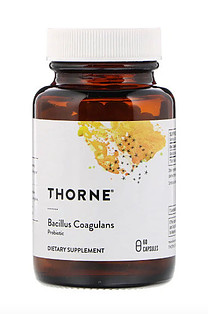 stable and doesn’t require refrigeration.
stable and doesn’t require refrigeration.
It is super gentle as well.
I’ve been using Thorne supplements for years, and they are top notch for quality and effectiveness.
Bacillus coagulans, also known as lactobacillus sporogenes, is a lactic-acid producing bacteria that is different than most other probiotic formulations. These bacteria are dormant while in the bottle, but once they are ingested, they will begin to grow and proliferate in the intestines.
Super cool! 🙂
Bacillus coagulans can also specifically help to increase protein absorption and utilization in the gastrointestinal tract.
I do keep mine in the refrigerator in general, but it will retain its potency and viability at room temperature no problem.
This product has helped improve my digestion and helps with bloating as well. It also stood out in helping reduce brain fog after about 3 or 4 weeks when I first started taking it.
The gut and brain are closely connected as explained above.
The standard dose for this probiotic is 1 capsule, 2 to 3 times per day.
Click here to check out Thorne Bacillus Coagulans.

2) Seeking Health ProBiota HistaminX
Seeking Health is one of my favorite lines of supplements, and I first found them when researching different probiotic products.
One may be sensitive to histamine if there is an acute gut infection present or other forms of imbalance/illness, so this is often something that needs to be considered when choosing supplements.
Interestingly, some strains of probiotics such as lactobacillus casei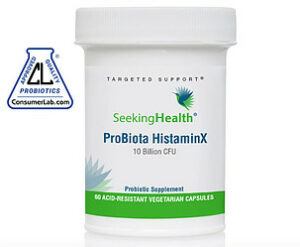 and lactobacillus reuteri actually produce histamine themselves. While this usually isn’t a problem, if a histamine sensitivity is present, these strains will need to be avoided or used in moderation.
and lactobacillus reuteri actually produce histamine themselves. While this usually isn’t a problem, if a histamine sensitivity is present, these strains will need to be avoided or used in moderation.
While I could tolerate a multi-strain probiotic with histamine producing strains in it ok, I knew I needed to find a product that I could include in my rotation that was histamine conscious.
Seeking Health ProBiota HistaminX fit that bill!
The 7 strains included in this product are not high histamine producing strains so it is great for anyone who has a sensitivity to histamine.
Each capsule contains 10 billion CFUs.
The standard dose is 1 to 2 capsules per day.
Like all my probiotic products, I take this one in a rotation with all of the others listed here and it does a great job of keeping my histamine sensitivity at bay.
This product is refrigerated.
You can add an ice pack to your purchase at Seeking Health, but their probiotics will maintain potency for 2 weeks without being kept cold.
Click here to check it out.
⭐️Use code HJE10 for 10% off of your purchase at Seeking Health :)⭐️
3) Seeking Health ProBiota 12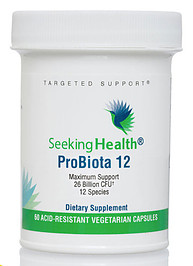
Seeking Health ProBiota 12 is another excellent probiotic by this line. It is a high potency multi-strain probiotic that contains 26 billion CFUs per capsule.
It contains 12 species of bacteria including lactobacillus, bifidobacterium, and streptococcus.
After about 3 weeks taking this product for the first time, I noticed a continued improvement in bloating and reduction in abdominal cramping after meals.
This product is refrigerated.
You can add an ice pack to your purchase at Seeking Health, but their probiotics will maintain potency for 2 weeks without being kept cold.
Click here to check it out.
⭐️Use code HJE10 for 10% off of your purchase at Seeking Health :)⭐️
In Closing…
Gut health is such a vital area to focus on throughout healing, and including a number of good probiotic products in one’s protocol is an important base to cover.
As a result of including all of these superior probiotic products in my protocol, not only have I experienced the improvements described above, but I’ve also been able to improve nutrient deficiencies and make considerable progress in healing my gut lining.
Nurturing our gut is one of the best steps we can take in achieving and maintaining optimal health, as giving due attention to this area is a key part of the healing process.
REFERENCES
I have read a few things on probiotics and gut health, but I have never read this much on the topic, what a great blog post! It is quite fascinating to see how the right balance of batteries in our gut can make a difference, even for the immune system. The science on that is still developing I think? Thank you for the 5 reviews, are any of these good to take after taking antibiotics or doesn’t it make a difference? thanks!
Hi Lizzy! Thank you for your comment :). You are most welcome! It really is so fascinating how our bacterial balance is so incredibly important for so many areas of our health! Yes, the science on this topic and gut health overall is still growing, as there are continually new discoveries being made on how gut bacterial balance, gut lining integrity, and many more factors regarding gut health have a wide array of influence on our health. I’m excited to continue to learn about this topic as the science continues to develop :). Typically, after someone has taken antibiotics, a lot of practitioners will recommend to use a high potency product such as VSL #3 for sufficient repopulation, although all of the products here would be considered generally high potency. Thank you and all the best to you! 🙂
This was particularly interesting to me because I have had problems with my gut. I have tried different probiotics but they don’t seem to make a difference. Is there a certain way to figure out what kind of probiotic to take or should I just try different ones until I find one that actually helps?
Hello! Thank you for your comment! There are specific forms of testing that you can acquire, such as Genova Diagnostics GI Effects Comprehensive Profile, that will show you which strains of bacteria you may be particularly lacking. Some people find it helpful to then supplement with those particular strains. Additionally, ensuring that the probiotic you are using is of relatively high potency and is also designed to withstand stomach acid and still maintain its viability are 2 elements that can be helpful.
I hope you experience improvements soon and I wish you all the best in your gut healing! 🙂
Hello Megan. Great post! I had no Ideal that your gut can affect your health in so many parts of your body and also affects mentally or your mood..Also the fact that there are good bacteria as much as bad bacteria is new to me.Thank for all your good information. In this community most of us eat junk food at least once in a while. Do you think most of us need to take this supplement?
Hi Claudia! Thank you so much for your comment :). You are most welcome!
Isn’t it so incredible how influential our bacterial balance is to our overall health! 🙂
I personally believe that most people could benefit from taking a good quality probiotic supplement today, especially because there are so many common factors in today’s world that can reduce the probiotic presence in the gut. Each person’s needs will differ, however, depending on their own unique health picture, or their own bioindividuality.
Thank you and I wish you all the best in your journey! 🙂